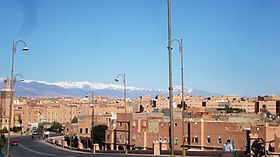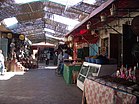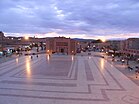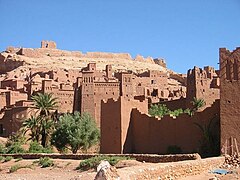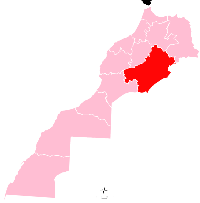Ouarzazate

Ouarzazate ورزازات | |
|---|---|
| Nickname: Door of the Desert | |
| Coordinates: 30°55′N 6°55′W / 30.917°N 6.917°W | |
| Country | |
| Region | Drâa-Tafilalet |
| Province | Ouarzazate |
| Population (2014)[1] | |
• Total | 71,067 |
| • Density | 233/km2 (600/sq mi) |
Ouarzazate (/ˌwɑːrzəˈzæt, -ˈzɑːt/; Arabic: ورزازات, romanized: Warzāzāt, IPA: [warzaːˈzaːt]), nicknamed the door of the desert, is a city and capital of Ouarzazate Province in the region of Drâa-Tafilalet, south-central Morocco.
Ouarzazate is a primary tourist destination in Morocco during the holidays, as well as a starting point for excursions into and across the Draa Valley and the desert. The fortified village Aït Benhaddou west of the city is a UNESCO World Heritage Site.
The Ouarzazate area is a noted film-making location, with Morocco's biggest studios inviting many international companies to work here. Films such as Lawrence of Arabia (1962), The Man Who Would Be King (1975), The Living Daylights (1987), The Last Temptation of Christ (1988), The Mummy (1999), Gladiator (2000), Kingdom of Heaven (2005), Kundun (1997), Legionnaire (1998), The Hills Have Eyes (2006), Salmon Fishing in the Yemen (2011) and The Wages of Fear (2024) were shot here, as was part of the TV series Game of Thrones. It was the filming location for the fictional city of Agapenta in the fourth season of the Netflix series Outer Banks.
Etymology
[edit]Its name comes from a Berber phrase meaning "without noise" or "without confusion".[citation needed]
History
[edit]For a long time, Ouarzazate was a small crossing point for African traders on their way to northern Morocco and Europe.[2] In the 16th century, Sheikh Abu al-'Abaas Ahmed bin Abdellah al-Wizkiti al-Warzazi, emir of the qasba of Ouarzazate and father of Lalla Masuda, helped establish Saadi control over the Sous-Dra'a region.[3][4]
Ouarzazate was home to a thriving Jewish community. In 1954, about 170 Jews lived in the Mellah.[5] The "Old Synagogue", a synagogue said to be nearly 300 years old, is located in Ouarzazate.[6] There is also a Jewish cemetery, which is no longer in use.[7]
During the French period, Ouarzazate expanded considerably as a garrison town, administrative centre and customs post and a church (Eglise Saint Therese) was built in 1931.[8] It is home to the Kasbah Taourirt, which was the kasbah of the former caïd and later owned by T'hami El Glaoui. The Krupp field gun which secured Glaoui power is displayed outside the kasbah today.[citation needed]
The city was part of the route of the 2006 and 2007 Dakar Rally.[citation needed]
The nearby Ouarzazate solar power station, co-funded by the Arab League,[9] was connected to the Moroccan power grid in February 2016.[10][11]
On 1 November 2023, Ouarzazate along with Casablanca joined UNESCO’s Creative Cities Network.[12][13]
Geography
[edit]Ouarzazate is at an elevation of 1,160 metres (3,810 ft)[citation needed] in the middle of a bare plateau south of the High Atlas Mountains, with a desert to the city's south.
Climate
[edit]Ouarzazate has a hot desert climate (Köppen climate classification BWh).[citation needed] The city is hot and dry in summer, but can be very cold in winter, with icy winds coming from the High Atlas Mountains.
| Climate data for Ouarzazate (Ouarzazate Airport) (1991–2020, extremes 1941–1963 and 1965–present)[a] | |||||||||||||
|---|---|---|---|---|---|---|---|---|---|---|---|---|---|
| Month | Jan | Feb | Mar | Apr | May | Jun | Jul | Aug | Sep | Oct | Nov | Dec | Year |
| Record high °C (°F) | 26.6 (79.9) | 29.8 (85.6) | 32.7 (90.9) | 35.0 (95.0) | 39.2 (102.6) | 43.6 (110.5) | 43.4 (110.1) | 44.0 (111.2) | 43.2 (109.8) | 36.3 (97.3) | 31.2 (88.2) | 27.2 (81.0) | 44.0 (111.2) |
| Mean daily maximum °C (°F) | 17.3 (63.1) | 19.3 (66.7) | 22.7 (72.9) | 26.7 (80.1) | 30.7 (87.3) | 35.5 (95.9) | 38.8 (101.8) | 37.5 (99.5) | 33.1 (91.6) | 27.5 (81.5) | 21.7 (71.1) | 17.7 (63.9) | 27.4 (81.3) |
| Daily mean °C (°F) | 9.6 (49.3) | 11.9 (53.4) | 15.5 (59.9) | 19.3 (66.7) | 23.2 (73.8) | 27.6 (81.7) | 30.8 (87.4) | 29.8 (85.6) | 25.6 (78.1) | 20.4 (68.7) | 14.5 (58.1) | 10.5 (50.9) | 19.9 (67.8) |
| Mean daily minimum °C (°F) | 1.8 (35.2) | 4.5 (40.1) | 8.2 (46.8) | 11.9 (53.4) | 15.7 (60.3) | 19.6 (67.3) | 22.7 (72.9) | 22.1 (71.8) | 18.1 (64.6) | 13.3 (55.9) | 7.2 (45.0) | 3.2 (37.8) | 12.4 (54.3) |
| Record low °C (°F) | −7.0 (19.4) | −5.4 (22.3) | −2.0 (28.4) | −1.0 (30.2) | 3.6 (38.5) | 7.6 (45.7) | 13.0 (55.4) | 12.6 (54.7) | 9.0 (48.2) | 4.0 (39.2) | −2.6 (27.3) | −4.9 (23.2) | −7.0 (19.4) |
| Average precipitation mm (inches) | 5.5 (0.22) | 14.2 (0.56) | 16.5 (0.65) | 6.6 (0.26) | 4.4 (0.17) | 6.6 (0.26) | 3.8 (0.15) | 12.3 (0.48) | 13.2 (0.52) | 14.8 (0.58) | 7.8 (0.31) | 9.5 (0.37) | 115.2 (4.54) |
| Average precipitation days (≥ 1.0 mm) | 1.0 | 1.7 | 2.2 | 1.0 | 0.9 | 1.1 | 1.0 | 2.6 | 1.7 | 2.0 | 1.3 | 1.6 | 18.1 |
| Average relative humidity (%) | 54 | 46 | 42 | 38 | 33 | 27 | 22 | 27 | 34 | 42 | 61 | 64 | 41 |
| Mean monthly sunshine hours | 261.8 | 251.5 | 291.7 | 317.8 | 343.2 | 336.7 | 316.3 | 294.9 | 273.2 | 273.1 | 256.5 | 250.3 | 3,467 |
| Source 1: NOAA (sun 1981–2010)[14][15] | |||||||||||||
| Source 2: Deutscher Wetterdienst (record highs for February, May, July, August, and November, record lows, and humidity)[16] Meteo Climat (all other record highs and record lows for June, July, September and October only)[17] | |||||||||||||
Landmarks
[edit]The Kasbah Taourirt is the city's historic kasbah (fortified residence, or tighremt in Berber languages). It was owned and expanded by the Glaoui family in the late 19th century and the 20th century.[18][19] Built mainly of rammed earth, it is one of the most impressive examples of this type of structure, which characterizes the architecture of the predominantly Berber-inhabited Atlas mountain and oasis regions of Morocco.[18]
A short distance west of the city is Aït Benhaddou, a historic ksar (fortified village) and a UNESCO World Heritage Site.[20]
Film industry
[edit]Film is a major industry in Ouarazazate and constitute a major part of its economy.[21] Its success is due to the presence of desert landscapes and historical architecture, the availability of trained technicians, low productions costs, and Morocco's streamlined process for obtaining film permits.[21] Most productions are from the USA or Western Europe, but the number of Indian and Chinese productions has also increased in recent years.[21] According to a study published in 2020, about 20 to 50 foreign film and television productions are shot in Ouarzazate every year.[21] In 2017, the heads of Moroccan film studios claimed that about 80 percent of staff used on film productions were Moroccan.[22]
Atlas Studios is the largest movie studios in the world in terms of land area.[21] It was established in 1983.[22] Movies were shot here including The Living Daylights, Asterix & Obelix: Mission Cleopatra, Lawrence of Arabia, The Man Who Would Be King, The Mummy, Kingdom of Heaven, Gladiator, Hanna, and Babel. It was also the location of an episode of the television series The Amazing Race 10 and Game of Thrones season 3. Prison Break season 5 was filmed here.[citation needed]
Another large studio in Ouarzazate is CLA Studios, established in 2004.[22]
The Cinema Museum, located across from the Kasbah Taourirt, opened in 2007 and is housed in a former film studio. The museum displays film sets, props, and technical equipment from previous productions.[23][22]
Notable people
[edit]- Ayoub El Amloud, professional footballer
- Romain Saiss, professional footballer
- Tasuta N-Imal, a desert blues band
Gallery
[edit]- A street in Ouarzazate
- Kasbah Ait Benhaddou
- Kasbah Aksar
- Oasis du Fint
- The back side of Kasbah Taourirt
- Ouarzazate old town
See also
[edit]- Tizi n'Tichka – mountain pass that connects Ouarzazate and Marrakesh
- List of movies shot in Morocco
- Ouarzazate Airport
- Ouarzazate solar power station
Notes
[edit]- ^ The record highs and lows are based on the Deutscher Wetterdienst link for the period 1941–1963 while records beyond 1965 come from the Meteo Climat link. As a result, the most extreme values from either source are used.
References
[edit]- ^ "POPULATION LÉGALE DES RÉGIONS, PROVINCES, PRÉFECTURES, MUNICIPALITÉS, ARRONDISSEMENTS ET COMMUNES DU ROYAUME D'APRÈS LES RÉSULTATS DU RGPH 2014" (in Arabic and French). High Commission for Planning, Morocco. 8 April 2015. Retrieved 29 September 2017.
- ^ "Visit Africa's Ouarzazate City, Morocco". visitafrica.site. Retrieved 2021-04-19.
- ^ "سيرة السيدة مسعودة الوزكيتية". وزارة الأوقاف والشؤون الإسلامية. June 24, 2019. Archived from the original on 2021-12-12.
- ^ مغرس مسعودة الوزكيتية .. الأميرة الحسنة Archived 23 December 2017 at the Wayback Machine
- ^ "Ouarzazate". Visiting Jewish Morocco. Retrieved 6 June 2024.
- ^ "16 Moroccan Synagogues: Remnants of Jewish Life in the Imperial Cities and Great South". Morocco Travel. Retrieved 6 June 2024.
- ^ "Cemetery at Ouarzazate, Morocco". Archive. Retrieved 6 June 2024.
- ^ Anglade, Eric. "The Franciscan missionary sisters of Mary will no longer be looking after Ouarzazate". SudEstMaroc. Almaouja. Retrieved 15 December 2023.
- ^ Harrabin, Roger (23 November 2015). "Moroccan solar plant to bring energy to a million people". Retrieved 3 October 2016 – via www.bbc.co.uk.
- ^ Vorrath, Sophie (2016-02-05). "First 160MW of huge Noor solar thermal plant connected to Moroccan grid". RenewEconomy. Retrieved 2019-06-04.
- ^ Louis Boisgibault, Fahad Al Kabbani (2020): Energy Transition in Metropolises, Rural Areas and Deserts. Wiley - ISTE. (Energy series) ISBN 9781786304995.
- ^ "Moroccan Cities Casablanca and Ouarzazate Join UNESCO's Creative Cities Network". HESPRESS English - Morocco News. 2023-11-01. Retrieved 2023-11-11.
- ^ "55 new cities join the UNESCO Creative Cities Network on World Cities Day". Retrieved 31 October 2023.
- ^ "Ouarzazate Climate Normals for 1991–2020". National Oceanic and Atmospheric Administration. Archived from the original on 7 October 2023. Retrieved 7 October 2023.
- ^ "World Meteorological Organization Climate Normals for 1981–2010". National Oceanic and Atmospheric Administration. Retrieved 10 November 2021.
- ^ "Klimatafel von Ouarzazate / Marokko" (PDF). Baseline climate means (1961–1990) from stations all over the world (in German). Deutscher Wetterdienst. Retrieved October 14, 2016.
- ^ "Station Ouarzazate" (in French). Météo Climat. Retrieved October 14, 2016.
- ^ a b Golvin, Lucien (December 1, 2012). "Architecture berbère". Encyclopédie berbère [online]. Retrieved April 10, 2020.
- ^ "Documentation for emergency condition mapping of Decorated historic surfaces at the Caid Residence, the Kasbah of Taourirt (Ouarzazate, Morocco)". ISPRS Annals of the Photogrammetry, Remote Sensing and Spatial Information Sciences. 2 (5/W3): 229–234. 2015.
- ^ "Ksar of Ait-Ben-Haddou". UNESCO World Heritage Centre. Retrieved 2023-12-15.
- ^ a b c d e Higbee, Will; Martin, Florence; Bahmad, Jamal (2020). Moroccan Cinema Uncut: Decentred Voices, Transnational Perspectives. Edinburgh University Press. pp. 23–25. ISBN 978-1-4744-7795-6.
- ^ a b c d Rutherford, Tristan (September–October 2017). "Morocco's Cinema City". Aramco World. pp. 24–31.
- ^ "Cinema Museum of Ouarzazate". Ouarzazate.city. Retrieved 2023-12-15.
External links
[edit]- Definitely Ouarzazate (facilities for filmmakers)
- Ouarzazate Film Commission
- Cinema Museum of Ouarzazate
- Movies shot in Ouarzazate at IMDb
 Ouarzazate travel guide from Wikivoyage
Ouarzazate travel guide from Wikivoyage

